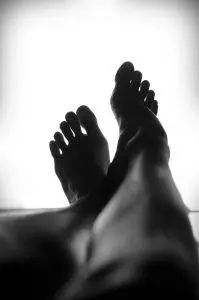By Qineng Tan, L.Ac., Ph.D. and Xiaomei Cai, L.Ac., Ph.D.

Swollen feet and ankles? Fluid retention in legs? These are signs of edema. Acupuncture and TCM offer natural diuretic herbs and alternative treatment for swelling in legs and feet.
Edema refers to when excess fluid in body tissues, or water retention, leads to swelling. Edema most commonly causes swollen ankles and swollen feet. But edema can occur in many parts of the body.
Blood vessels have tiny valves that work to push blood from the lower body back up to the heart. When this process isn’t working properly, blood and other fluids will gather in the legs and cause swollen feet and ankles.
Edema causes puffiness under the skin, and when you press on the skin, it leaves an imprint. The skin may be shiny and stretched because of water retention.
Other edema symptoms can include a feeling of heaviness in the legs, and a swollen belly or distended abdomen.
Everyone experiences edema once in a while; for example, after a long airplane flight, which causes fluids to pool in the legs and feet, or the day after eating particularly salty foods, which can cause water retention. Edema is also common during pregnancy, when increased blood volume and pressure from the growing uterus can cause edema in the legs.
Occasional edema can often be prevented or remedied by reducing salt intake, drinking more water, and wearing compression garments.
Some health conditions can cause edema, in which case, both the underlying issue and the edema itself need to be addressed.
Acupuncture and Chinese herbs can help relieve swollen ankles and feet due to water retention, as well as helping to address the root cause of edema.
Causes of Edema

Edema can happen when a person stays in one position for a long time and fluids build up in the lower body due to gravity. This type of swelling can be helped by getting up and moving around regularly and/or wearing compression socks that prevent water retention from causing swollen ankles and feet.
Cardiovascular issues having to do with heart function or the health of blood vessels can cause edema. When the heart doesn’t pump blood effectively, it can cause fluid buildup in the legs, ankles, and feet. Venous insufficiency, or weakness in the veins, can prevent blood from being pushed back to the heart properly, which leads to varicose veins and blood buildup in the legs.
Kidney disease and liver disease can contribute to edema. Damaged kidneys are less able to remove excess fluid, leading to swelling. Conditions like cirrhosis can increase pressure in blood vessels and reduce proteins that keep fluid in the bloodstream, causing edema.
Blocked or damaged lymph nodes can prevent lymph fluid from draining well, causing localized edema. This is known as lymphedema. Lymphedema can be related to cancer treatments, when lymph nodes are removed.
People may experience edema after a stroke or cardiac event like a heart attack.
Side effects from some drugs, including those for high blood pressure and corticosteroids, can cause fluid retention.
Conditions such as cellulitis or arthritis can cause inflammation and localized swelling.
When there are underlying conditions like cirrhosis, kidney problems, and vascular issues, they must be addressed in order to resolve the edema.
Treatment for Swollen Legs and Feet
Conventional medical treatments for edema typically focus on addressing the underlying cause and managing symptoms. Typical medical treatment for edema may include:
- Diuretics to help the body expel excess fluid through urine.
- Compression stockings to help reduce swelling by promoting fluid movement in the legs.
- Elevating the affected limbs above the level of the heart can help reduce swelling.
- Lowering sodium in the diet can help prevent fluid retention.
- Regular exercise to improve circulation and help reduce swelling.
- Addressing heart, kidney, or liver issues can help manage edema.
Using diuretic medications may seem to alleviate swelling in the short term, but these drugs create a kind of dependency. As soon as a person stops taking the diuretics, the water retention will return.
Chinese herbal formulations can act as natural diuretics, while addressing the root cause of edema.
By integrating acupuncture and TCM into your treatment plan, you may find a holistic approach that addresses not only the symptoms of edema but also its cause, providing lasting relief from edema swelling.
Can Acupuncture Help Edema?

TCM theory for the treatment of edema goes back over 2000 years. The Yellow Emperor wrote about edema treatment in his medical text before 100 B.C., describing the disruption of fluid movement in the body. In the second century A.D., another well-known Chinese doctor Zhang Zhong-Jing detailed treatments for edema with herb formulas, which are still considered classics today.
Edema can be related to imbalances in Yin and Yang. Yin edema affects the spleen and kidneys, while Yang edema affects the spleen and lungs. Yin edema symptoms tend to start in the lower body, with swollen feet and ankles, while Yang edema symptoms tend to start in the upper body, with the tendency to have tight, shiny skin.
According to TCM, the organ systems of the Spleen, Kidneys, and Lungs must be balanced in order to restore proper functioning of fluid metabolism. An acupuncture treatment protocol would be directed towards clearing wind, heat, dampness, and other pathogenic forces, while balancing Yin and Yang, and regulating Qi and Blood.
Different pathologies of edema can be described by TCM diagnoses, including:
- Blood stasis
- Qi stagnation
- Damp heat
- Heat toxins
- Wind-cold or Wind-heat in the lungs
Recent research shows that ancient herb formulas can help regulate fluids and have a positive effect on vascular function.
Moxibustion, a TCM modality that involves warming acupoint areas by burning mugwort herb near the skin, is often used to help relieve edema. Moxa treatment can help improve blood flow by warming and dispersing dampness and phlegm and invigorating the spleen and kidneys.
One study of patients suffering from swelling in legs and ankles showed that moxibustion helped relieve swelling in the legs.
Breast cancer treatment often involves radiation treatment that affects the lymph nodes, or the removal of lymph nodes, which can lead to lymphedema. This type of lymphedema often affects one arm, or both arms. It can also affect other parts of the body.
One study involved using acupuncture treatment twice a week to help relieve lymphedema after cancer treatment. More than half of the patients experienced a significant improvement in lymphedema, as measured by arm circumference. The conclusion was that acupuncture is a safe treatment that can help reduce swelling.
Acupuncture treatment improves blood flow and the movement of fluids in general, while nourishing the kidneys and spleen. Moxibustion can be used to further stimulate the flow of blood and Qi.
Acupuncture Near Me for Edema in West Los Angeles
Edema is a common problem, but it requires an individualized approach, as it can have many different root causes. Experienced acupuncture practitioners like Dr. Tan and Dr. Cai at Art of Wellness in Westwood, CA can help patients find relief from edema swelling and water retention in legs through a combination of acupuncture, moxa, herbs, and personalized nutrition counseling.
*This article is for education from the perspective of Traditional Chinese Medicine only. The education provided by this article is not approved by FDA to diagnose, prevent, treat and cure human diseases. It should not stop you from consulting with your physician for your medical conditions. Traditional Chinese Medicine is based on Qi, which is an invisible force that usually cannot be observed by modern science. Because science focuses on testing ideas about the natural world with evidence obtained through observation, these aspects of acupuncture can’t be studied by science. Therefore acupuncture and Chinese herbs are often not supported by double-blind, randomized trials, and they are considered alternative medicine therapies in the United States.
